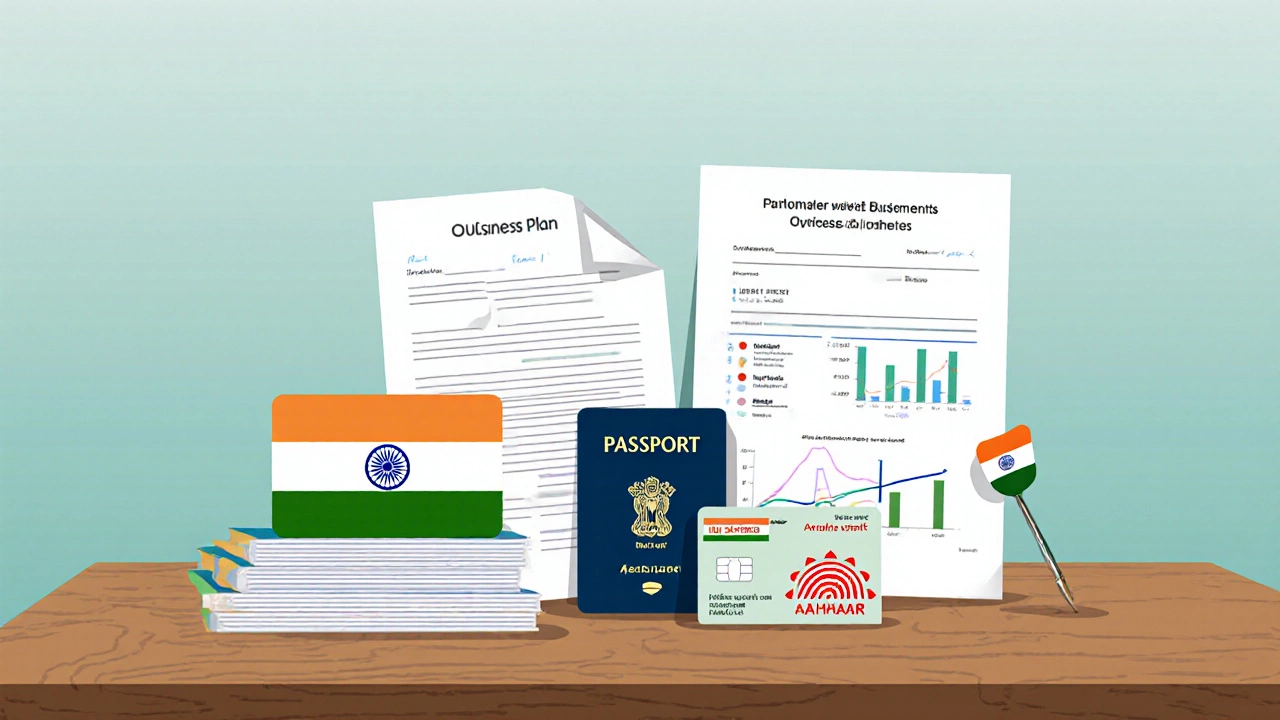
NRI Business Loan Eligibility Checker
Your Eligibility Assessment
Answer questions above to see if you qualify for an NRI business loan.
When an NRI business loan is a loan product Indian banks offer to Non‑Resident Indians for business purposes you instantly face two questions: “Can I get it?” and “What do I need to do?” This guide walks you through everything an NRI needs to know to secure a business loan in India in 2025 - from eligibility rules and paperwork to the best banks and typical loan terms.
Who Qualifies? NRI Eligibility Criteria
Eligibility hinges on both regulatory guidelines and individual bank policies. The core criteria are:
- Legal status as an Non‑Resident Indian any Indian citizen who resides outside India for employment, business or other purposes for at least 182 days a year or an Overseas Citizen of India a person of Indian origin who holds OCI status.
- Minimum age of 21 years and not older than 65 at loan maturity.
- Valid passport with a minimum of two years’ remaining validity.
- Proof of overseas income (salary slips, tax returns, bank statements) showing sufficient repayment capacity - generally a net monthly income of at least ₹3 lakhs (≈ $3,600) for standard loan sizes.
- Good credit history in the country of residence; many banks also pull a home‑country credit score.
- Compliance with the Foreign Exchange Management Act India’s regulatory framework governing cross‑border capital flows and Reserve Bank of India the central bank that sets the rules for NRI lending guidelines.
If you tick these boxes, you’re on the right track.
Key Documents You’ll Need
Banks ask for a mix of Indian and overseas paperwork. Here’s a checklist you can download and fill out before you start:
- Copy of passport (first & last page, visa pages if any).
- Proof of overseas residency - utility bill, rental agreement, or government‑issued ID from your current country.
- Recent salary slips (last 3 months) and overseas tax returns (last 2 years).
- Bank statements from both your foreign account (last 6 months) and any Indian NRE/NRO account you hold.
- Indian PAN (Permanent Account Number) card - mandatory for all credit transactions.
- Aadhaar card - required for KYC, even if you’re an NRI; you can link it to your NRO/NRE account.
- Business plan or project proposal (for new ventures) - includes cash‑flow projections, market analysis, and repayment schedule.
- Company registration documents (if you already own an Indian entity) - Certificate of Incorporation, GST registration, and board resolution authorizing the loan.
Having everything ready cuts processing time dramatically - from the usual 4‑6 weeks down to 2‑3 weeks for most banks.
Which Indian Banks Offer NRI Business Loans?
Not all banks treat NRI borrowers the same way. Below are the top five banks that actively provide NRI business loans loans tailored for non‑resident Indians wanting to fund or expand a business in India. They have dedicated NRI desks, online application portals, and competitive rates.
| Bank | Interest Rate (p.a.) | Max Loan Amount | Tenure | Collateral Needed? | Processing Fee |
|---|---|---|---|---|---|
| State Bank of India India’s largest public sector bank | 9.75% - 12.25% | ₹5 crore (≈ $600k) | Up to 7 years | Yes, for loans > ₹1 crore | 0.5% of loan amount |
| HDFC Bank Leading private‑sector lender | 9.50% - 11.80% | ₹3 crore | Up to 5 years | Usually required for > ₹50 lakh | 0.75% |
| ICICI Bank Major private bank with strong NRI focus | 9.60% - 12.00% | ₹4 crore | Up to 6 years | Collateral for > ₹75 lakh | 0.6% |
| Kotak Mahindra Bank Fast‑growing private bank | 9.80% - 13.00% | ₹2 crore | Up to 5 years | Depends on business turnover | 0.7% |
| Axis Bank Established private sector lender | 9.90% - 12.50% | ₹3.5 crore | Up to 6 years | Collateral for > ₹60 lakh | 0.65% |

Typical Loan Terms You’ll Encounter
Understanding the fine print helps you compare offers objectively. Here are the most common elements:
- Interest Rates: Banks tie rates to the RBI’s Base Rate + a spread that depends on your credit score and loan‑to‑value ratio.
- Repayment Structure: Most banks use EMI (Equated Monthly Installment) schedules. Some allow a moratorium of 6‑12 months for start‑up ventures.
- Tenure: Generally 2-7 years. Longer tenures reduce EMI size but increase total interest paid.
- Collateral: Real‑estate, fixed deposits, or the business’s assets can be pledged. Some banks offer unsecured loans up to ₹50 lakh for high‑net‑worth NRIs.
- Processing Fee: Usually 0.5%-1% of the sanctioned amount, charged upfront.
- Pre‑payment Penalty: Most banks waive it for NRI borrowers, but check the clause.
Step‑By‑Step Application Process
- Pre‑screen yourself. Use the eligibility checklist above to see if you meet the minimum requirements.
- Choose the right bank. Compare interest rates, processing fees, and collateral demands using the table.
- Gather documents. Prepare the full document list; many banks allow you to upload PDFs on their portal.
- Submit the online application. Fill out the NRI business loan form, attach copies, and authorize a credit check.
- Attend the KYC/verification meeting. Some banks ask for a video conference with the NRI desk, during which you’ll confirm identity and discuss the business plan.
- Await approval. Turnaround time ranges from 5 days (for pre‑approved customers) to 3 weeks (for first‑time borrowers).
- Sign the loan agreement. The contract must be executed in the presence of a notary, and the original signed copy is sent to the bank’s NRI branch.
- Disbursement. Funds are credited either to your NRE/NRO account or directly to the business’s current account.
Keeping copies of every email and signed document helps if there’s any dispute later.

Common Pitfalls & Pro Tips
Even after you clear the formalities, many NRIs stumble on avoidable issues. Here’s how to stay clear:
- Ignore currency fluctuations. If your income is in USD, a sudden INR appreciation can raise the effective repayment cost. Consider a partial hedge or a loan with a floating rate linked to RBI’s repo rate.
- Skip GST registration. Businesses without a valid GST number often face loan‑disbursement delays.
- Under‑estimate collateral. Banks may ask for a higher valuation after site visits. Have a backup asset ready.
- Forget to update your NRE/NRO account details. If the bank can’t locate your Indian account, the money may sit idle for weeks.
- Overlook pre‑payment options. Paying off early can save interest, but only if the bank doesn’t levy a penalty.
- Rely solely on one bank. Even if a bank says “yes,” another may offer a 0.5% lower rate. A quick quote from two or three banks can shave thousands off the total cost.
Follow these tips, and your NRI business loan experience will be smoother and cheaper.
Quick Takeaways
- You can get a business loan in India as an NRI provided you meet RBI/FEMA guidelines.
- Key documents: passport, PAN, Aadhaar, overseas income proofs, Indian business registration, and a solid business plan.
- Top banks - SBI, HDFC, ICICI, Kotak Mahindra, Axis - each has slightly different rates and collateral rules.
- Typical rates range from 9.5% to 13% p.a.; tenures up to 7 years.
- Apply online, be ready for a video KYC, and keep all paperwork organized for faster approval.
Can an NRI obtain an unsecured business loan in India?
Yes, a few banks (e.g., HDFC and ICICI) offer unsecured loans up to ₹50 lakh for NRIs with strong overseas credit scores and high net worth. However, interest rates are slightly higher and the loan amount is capped compared to secured options.
Do I need an Indian PAN and Aadhaar if I’m an NRI?
Both are mandatory for any credit facility in India. You can apply for PAN online from abroad, and Aadhaar can be linked to your NRO/NRE account once you have a physical address in India.
How does the Foreign Exchange Management Act affect my loan?
FEMA regulates the repatriation of loan proceeds and repayments. Generally, you can remit the loan amount to India and repay it in foreign currency, but the bank must report the transaction to RBI. Ensure the loan agreement mentions FEMA compliance.
What is the typical processing time for an NRI business loan?
Processing takes about 2-3 weeks if you submit a complete dossier and have an existing NRE/NRO account. First‑time applicants may experience a 4‑6 week timeline.
Can I use the loan for overseas expenses?
No. The loan must be used for a genuine Indian business purpose - buying equipment, expanding premises, working capital, etc. Using it for foreign expenses violates FEMA and can lead to legal penalties.







Write a comment